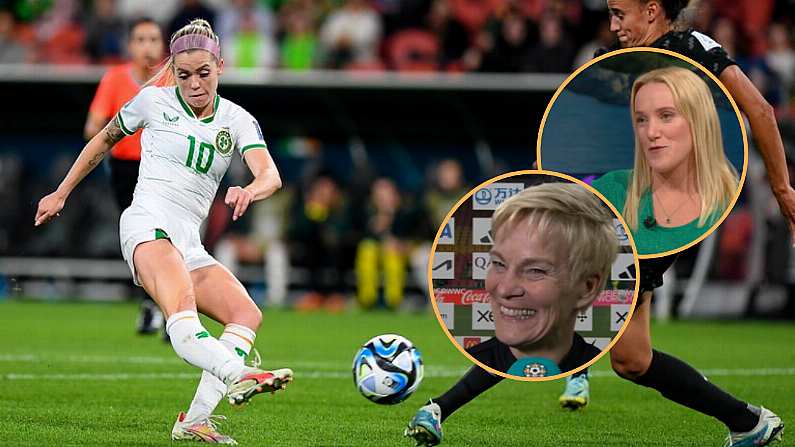For Vera Pauw, the road ahead looks uncertain after Ireland's premature exit from the World Cup.
A memorable qualifying campaign brought Ireland to their first ever major tournament in Australia, but they were ultimately eliminated before they had a chance of seeing any of the co-host nation New Zealand.
After narrow defeats to Australia and Canada in their opening two games, Ireland did manage to secure a draw in their final group game against Nigeria on Monday, though some of the decisions made in the earlier matches may leave fans wondering what might have been.
READ HERE: George Hamilton Brilliantly Puts Achievement Of Ireland WNT Into Perspective
One of those was the defensive role handed to Denise O'Sullivan in the Australia and Canada matches.
O'Sullivan is one of the outstanding players on this Irish team, with more creative ability in midfield than any one in the squad, though she found herself resigned to playing in a deeper role for much of the World Cup.
In the closing stages against the Aussies, O'Sullivan was pushed higher up the pitch and Ireland's attacking output immediately increased and, eventually, she would be pushed further up the pitch from the word go against Nigeria.
Ireland looked far more capable of creating chances with O'Sullivan in her natural attacking role in the final group game, and it's hard not to wonder whether the results would have been different in the opening two group games if she had played in the same position.
Ireland WNT: RTÉ panel question Vera Pauw's decision on Denise O'Sullivan position
Ireland manager Vera Pauw spoke to RTÉ Sport's Tony O'Donoghue at full-time in Brisbane on Monday, and broke down what she felt Ireland had done well against Nigeria.
Vera Pauw was delighted by how Ireland's game plan was executed against Nigeria. #wwc2023 #coygig
📺Watch https://t.co/JYf06csIye
📻Listen https://t.co/dVJTUVZZpa
📱Follow https://t.co/SLkGjEuRnT pic.twitter.com/YrSUc3xfN0— RTÉ Soccer (@RTEsoccer) July 31, 2023
She said that they had improved their chance creation - thanks in no small part to the work of O'Sullivan - and was impressed that the team had managed to hold off the pace of the Nigerian attack:
We were getting to their goal - we've created chances, but we need to get there to score. We've done that so much better than in the earlier games.
If you see what they've [Nigeria] done against Australia, how they put Australia under pressure and how they use their pace, there wasn't one time that they could do that to use. So our gameplan worked again.
[Playing O'Sullivan higher up the pitch] was a choice that was possible in this game. When Abbie Larkin came on, we put her [O'Sullivan] in her old position - not to hold, this was more because we couldn't switch the play anymore. She immediately did that.
From the moment of the switch, we were in our play again.
Pauw appeared to confirm that the positioning of O'Sullivan deeper in midfield was a decision made more out of necessity than out of choice, and explained why she had moved back into that role late in the day against Nigeria.
Reacting to Pauw's interview, Ireland footballer Méabh de Burca questioned the logic of "sacrificing" one of Ireland's most dynamic players in favour of a defensive game plan.
De Burca pointed out how much Ireland's attacking play improved when O'Sullivan was pushed forward against Nigeria:
She seems delighted. In fairness, you would be after getting a point against Nigeria...they definitely should be ranked higher than 40th in the world at the moment.
They did well with the gameplan. What she said there was interesting, that it was a choice to play Denise where they've been playing her. I think Denise was actually sacrificed in the first two games in order to have our gameplan more defensive.
You could see today when she was released, the freedom that she played with was just incredible to watch, the chances she could create. It is satisfying for all involved that they at least got a point today. It was a great springboard, like we said earlier













